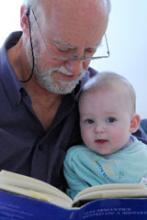What Is It
It sounds plausible to require that all our beliefs be based on evidence and sound reasoning. Yet some people's most cherished beliefs, like their belief in a deity, are based on faith alone. Does that make those beliefs fundamentally irrational, or could there be some rational justification for such faith? And what about reason itself—are there limits to what can be known rationally? Does our reliance on reason demand a kind of faith of its own? Is there a way to reconcile faith and reason, or does the well-lived life demand that we choose one over the other? John Ken put reasonable faith in Howard Wettstein from UC Riverside, author of The Significance of Religious Experience. This program was recorded live on campus as part of the Stanford Continuing Studies course The Art of Living.
Listening Notes
Ken recognizes that religion offers a comforting and inspiring vision of the universe, but he also sees religious belief as completely irrational. He wants to know how we can distinguish these beliefs between illusions and fairy tales.
John gives a series of suggestions for dealing with the divide between faith and reason. For example, he could pick and choose the parts that make religion work for him. Or he could accept religion as fundamentally fictional, but still act as if it were true (this is called fictionalism, used originally in the philosophy of mathematics). There is also the notion of a ‘leap of faith’, whereby a person lets their heart take them where their mind won’t let them go.
Howard Wettstein joins the conversation. He suggests that we focus on religious practice rather than belief. He defines religious practices as “ways of channeling, focusing, and celebrating the sense of profound awe that humans uniquely experience.” This feeling of awe is not merely a sensation but a kind of humbling elevation.
Wettstein also claims that believing in God is different from believing that he exists. He finds deep and meaningful truths in the Bible, even though he doesn’t think every sentence and fact purported therein would hold under historical scrutiny. He likens it to any other great work of fiction in this sense.
In all, Wettstein thinks that we need to be able to look at the Bible without being confined by the metaphysical lens of Medieval philosophy, which tried to understand the testaments through Greek concepts. Rather than seeing religion as a matter of belief or faith, we should understand it in a more aesthetic sense. To quote Woody Allen, “His faith is like an ear for music, or the talent to draw.”
- Roving Philosophical Reporter (skip to 6:24): Caitlin Esch interviews religious leaders from a diversity of faiths. She asks about how and why people lose their faith. Most state that the loss of faith has to do with immature expectations of who God is, held over from childhood (i.e. the bearded puppet-master in the clouds). Almost all of the religious leaders suggest that doubt is an integral part of faith, and that finding a more sophisticated notion of God to fit with the realities of the world is of great importance.
- Sixty-Second Philosopher (skip to 49:26): Ian Shoales tells two stories about having undue faith during his childhood: being tricked into thinking there was a bear in the bushes behind his house (by the neighborhood boys) or that the governor of California was a communist (by his health teacher). Thankfully, his mom was there to put him back on the right track.
